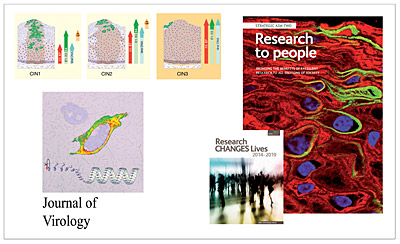Human papilloma viruses (HPVs) are estimated to cause around 5% of all human cancers [1] as well as serious benign disease in some individuals. There are no antivirals against HPV and treatment options for precursor lesions, end-stage cancers and papillomas typically involve surgical removal, destructive agents, or in some instances local immune modulation. Disease recurrence is a significant problem. Although vaccination represents a partial solution in some settings, it has only marginal value for those already infected. In such cases, a better understanding of the disease process and how this results from HPV infection is a crucial requirement.
Research in the HPV laboratory seeks to understand how HPV infection leads to disease. Over the past few years we have built up a coherent picture of the papillomavirus life cycle in differentiating epithelium (reviewed in [2,3]; [4,5,6,7]). We have also developed a repertoire of unique antibodies [7,8,9], and a variety of techniques to following HPV replication in raft cultures in vitro [4,5,6,10,11,12,13], in animal models [14,15,16] and in patient tissue samples [8,17,18,19] that will allow the detailed analysis of HPV growth, the host systems with which they interact and the clinical conditions that ensue.
Our future work will focus specifically on:
- the molecular basis of PV life-cycle de-regulation that occurs at particular epithelial sites (i.e. epithelial tropisms), and how this can lead to neoplasia of different grades.
- the mechanisms of lesion-formation and lesion regression, and in particular, the role of the wound-healing response in infection.
- the events that lead to, and which regulate papillomavirus latency, asymptomatic infection and reactivation.
Insights from this work will continue to be used to develop better diagnostic approaches for cervical (and other) HPV disease, and to develop effective methods for of interfering with HPV replication and persistence following infection.

Professor John Doorbar
Principal Investigator
Group Members


